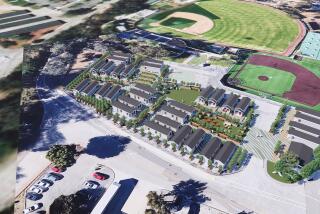Chula Vista Seeks New Talks on Bayfront Land Deal
- Share via
Chula Vista officials were unfairly excluded from “secret” negotiations that produced a settlement barring development along their bayfront and should be given a chance to have their say in a new mediation process, a lawyer for the city said Tuesday.
Attorney William Grauer made that argument at a federal court hearing called to obtain judicial approval of the settlement, which will create a wildlife refuge on the bayfront while prohibiting construction on ecologically sensitive Gunpowder Point.
After the spirited, three-hour courtroom session, U.S. District Judge Gordon Thompson said he would announce his ruling Friday. Thompson is expected either to approve the legal agreement or possibly require that parties return to the negotiating table with the city as a party to the discussions.
Under the settlement, unveiled last week, the bayfront’s landowner has agreed to scrap plans for a hotel and convention center on Gunpowder Point and convey 273 acres of land to the U.S. Fish and Wildlife Service, which will manage it as a refuge for two endangered birds--the California least tern and the light-footed clapper rail.
In return, the Sierra Club and the League for Coastal Protection will drop two lawsuits that have blocked development along the waterfront and held up a critically needed freeway project and a flood-control channel for the Sweetwater River.
The environmental groups also have pledged not to oppose development on a 103-acre area of the bayfront where developers plan to build homes, industrial facilities and commercial and office buildings.
The agreement between the Chula Vista Investment Co., a joint venture of Santa Fe Land Improvement Co. and Watt Industries, and their longtime environmental adversaries capped nearly two years of periodic negotiations.
Demonstrating a rarely seen unity, attorneys for the environmentalists and the developer on Tuesday touted the settlement as a reasonable solution that will preserve fast-dwindling wetland habitat and protect endangered birds while allowing some development of the shoreline to proceed.
But Grauer, echoing opposition voiced earlier by Chula Vista Mayor Greg Cox, sharply attacked the agreement and urged Thompson to require the parties to renew negotiations--with the city as a full partner.
Calling the settlement a “secret deal” that “carves up Chula Vista like a piece of pie,” Grauer said city leaders were “completely excluded” from a process that “directly affects what the city is going to look like for literally 100 years.”
Grauer also argued that the settlement violated several federal regulations--which an attorney from the Department of Justice in Washington disputed in court Tuesday--and expressed skepticism about the Fish and Wildlife Service’s ability to manage the bird refuge.
“They’ll just put a fence around it and Chula Vista will have a dumping ground and a haven for illegal aliens on their waterfront,” Grauer said.
Thompson, however, did not seem sympathetic, and he questioned Grauer vigorously. For one thing, the judge did not seem to buy the attorney’s argument that Chula Vista was completely in the dark about the settlement.
“How could this have been ‘secret?’ Didn’t you have any contact with anyone involved in the negotiations?” Thompson, seemingly incredulous, asked Grauer. “Did the city just bury its head in the sand for six months?”
Thompson also indicated impatience with the city’s argument that it should be permitted to influence the fate of privately held land. In one particularly testy exchange, the judge said, “Isn’t it just that you want your fingers in their pie?”
When Grauer responded, “It’s our pie,” the judge quickly corrected him: “No, no,” he said. “It’s their pie. Let’s not forget that. Land is owned.”
Another area of dispute centered on whether Chula Vista had been denied a fair chance to take part in settlement talks. Donald Worley, representing the Chula Vista Investment Co., said the developer had urged the city to participate in negotiations but was told Chula Vista’s position was non-negotiable.
“Chula Vista has been adamant throughout this entire process that the protection of their right to develop a hotel on Gunpowder Point is the sine qua non for settlement of this case,” attorney Donald Worley said. “They claim that is the linchpin of their (bayfront plan).”
But Grauer countered that the city “is ready to negotiate everything” and added that “something with this great an impact on the way Chula Vista is going to look shouldn’t be rushed through.”
More to Read
Sign up for Essential California
The most important California stories and recommendations in your inbox every morning.
You may occasionally receive promotional content from the Los Angeles Times.










